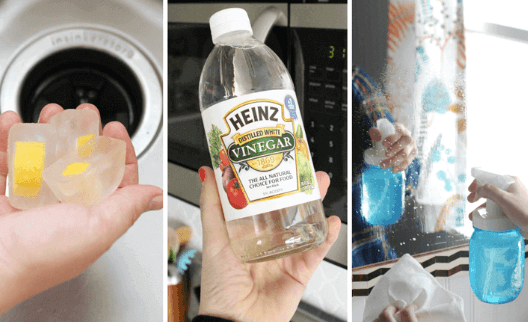By now most homeowners know some of the benefits of cleaning with distilled white vinegar. We probably are aware it is a “go to” for removing stains in carpeting, deodorizing pet urine and cleaning hard water stains. However, many of us may not be aware of materials and items that should not be cleaned with distilled white vinegar.
This will inform you about which materials should never be cleaned with vinegar and explain why. Also, this includes a few suggestions you might not know about for cleaning with this common natural cleaner.
What Not to Clean with Distilled White Vinegar
Remember that distilled white vinegar is acidic and therefore it can damage certain surfaces. It can permanently damage the finish on stone tile and granite and the functionality of some household appliances.
Here is a list of materials and items that should not be cleaned using vinegar:
- stone surfaces, such as marble, granite, ceramic and slate
- no-wax floors
- unsealed grout
- clothing irons
- electronic devices and their screens
- waxed or finished wood furniture
- carbon steel knives
- cast iron cookware
- appliances with aluminum parts
- egg spills, as vinegar can make it tougher to clean due to coagulation
Note: This list is not complete so if you are unsure about cleaning a particular item with vinegar, it’s best to check the manufacturer’s care instructions.
Three Quick Tips for Cleaning with Vinegar
Despite the potential harmful effects of vinegar on certain surfaces and materials, it remains an inexpensive and natural, effective cleaner for many situations. The following are three great uses for cleaning with vinegar that will make your chores get done much easier and more efficiently.
Cleaning Chrome
Items you will need:
- one cup vinegar
- bottle for spraying
- microfiber cloths
- Put the vinegar into a the bottle and spray it on your chrome and stainless-steel surfaces that need to be cleaned.
- Wipe away the vinegar with a cloth.
- Take another dry, clean cloth and buff the surface until all streaks are gone.
Cleaning Windows and Glass
Items you will need:
- vinegar
- water
- bottle for spraying
- coffee filters or microfiber cloths
- Mix an equal amount of the vinegar and water in the bottle.
- Spray the liquid onto the window or glass, making sure not to apply too much to prevent streaks.
- Work from top to bottom and wipe the window or glass clean using a cloth or coffee filter. If you have streaks, use a fresh cloth or filter.
Cleaning Toilet Bowls
Items you will need:
- one cup vinegar, divided into two half cups
- a toilet brush
- bottle for spraying
- a clean microfiber cloth
- Pour one-half cup of vinegar into the toilet bowl and let it sit for up to five minutes.
- Add the second half-cup of vinegar into the spray bottle and spray the rim. Let it sit for up to five minutes.
- Use the toilet brush to scrub the bowl and wipe down the rim with a microfiber cloth.
- Flush when you are finished.
Once you know what can and cannot be cleaned with distilled white vinegar, you can use it to clean more naturally and inexpensively without worry. But, as you know, there isn’t any cleaner that will work if you don’t have the time to use it and do the cleaning. If you’re finding it difficult to keep up with your housekeeping, contact a local reputable home cleaning company for some assistance.
Maid Spotless Cleaning Services offers a full-suite of professional house cleaning services in Albany and the Greater Capital Region.


Recent Comments